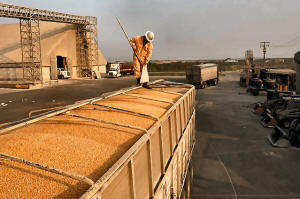|
Exclusive: As Trump trashes NAFTA, Mexico
turns to Brazilian corn
 Send a link to a friend
Send a link to a friend
 [February 22, 2018]
By P.J. Huffstutter and Adriana Barrera [February 22, 2018]
By P.J. Huffstutter and Adriana Barrera
CHICAGO/MEXICO CITY (Reuters) - Mexican
buyers imported ten times more corn from Brazil last year amid concern
that NAFTA renegotiations could disrupt their U.S. supplies, according
to government data and top grains merchants.
Mexico is on track to buy more Brazilian corn in 2018, which would hurt
a U.S. agricultural sector already struggling with low grains prices and
the rising competitive threat from South America.
U.S. farmers, food processors and grain traders have spent months trying
to prevent trade relationships from falling apart if the North American
Free Trade Agreement implodes. They are trying to protect more than $19
billion in sales to Mexican buyers of everything from corn and soybeans
to dairy and poultry.
Despite their efforts, South American corn shipments to Mexico are
surging. Mexican buyers imported a total of more than 583,000 metric
tonnes of Brazilian corn last year – a 970 percent jump over 2016,
according to data from Mexico's Agrifood and Fishery Information Service
(SIAP). The purchases all came in the last four months of last year.

Mexico has long been the top importer of U.S. corn, and is the second
largest buyer of U.S. soybeans. But Mexican buyers are shifting to
Brazilian corn to reduce their decades-old reliance on U.S. supplies for
mills, and for animal feed for pigs and cows.
Cheaper prices for Brazilian corn drove some of the sales. But in other
cases, Mexican buyers bought Brazilian corn even when it cost more than
U.S. supplies, executives and traders told Reuters.
"We bought from Brazil for two reasons," said Edmundo Miranda,
commercial director of Grupo Gramosa, one of Mexico's top grains
merchants. "One, because it was competitive. Two, to see how practical
and profitable it was to buy from Brazil or Argentina given the
possibility of trade tariffs because of NAFTA renegotiations."
Gramosa and its domestic rival Comercializadora Portimex didn't import
any Brazilian corn in 2016. But last year, they imported nearly 260,000
metric tonnes of it - worth about $44 million at current prices -
between September and December. The deals have not been previously
reported.
U.S. corn exports to Mexico also rose, despite the rapid increase in the
flow from Brazil, because Mexico needed record imports in 2017 to
compensate for the impact of a drought on domestic corn production.
Mexico boosted U.S. imports by 6.6 percent, according to U.S. Department
of Agriculture data. Mexico buys far more corn from the United States
than Brazil, taking 14.7 million tonnes in 2017, according to U.S.
government data.
Brazil continues to make inroads into U.S. market share, however, and
Mexican purchases of Brazilian corn continued in January, rising to
100,000 metric tonnes from none a year earlier, according to Mexican
government and trade sources.

TENSE TALKS
U.S. President Donald Trump has said he will scrap NAFTA if his
administration cannot negotiate trade terms with Mexico and Canada that
are more favorable to the United States. The next round of talks is
later this month.
An end to NAFTA, farm and trade groups say, would likely lead to
increased tariffs on grains trade, hurting one of the electoral
constituencies that carried Trump to power. During his campaign, Trump
promised farming communities that agriculture would benefit from his
presidency.
White House spokeswoman Lindsay Walters said the Trump administration
aims to increase market access for U.S. agriculture in NAFTA
renegotiations. U.S. agriculture has "generally done well under NAFTA,"
Walters said, but "there is more work to be done."
U.S. agriculture industry groups have fought to keep their trade
advantages since Trump took power, eager to retain tariff-free or
low-tariff access when trading with Mexico, Canada and other countries.
Most larger farming enterprises and trade groups involved in supplying
the largest food staples are pro-NAFTA. Smaller farmers have been more
critical as they have struggled to compete with some of the cheaper
imports that resulted from NAFTA.
[to top of second column]
|

An employee takes samples of corn imported from Brazil for a quality
test at a warehouse in the terminal port of Portimex in Tuxpan, in
Veracruz state, Mexico February 21, 2018. Picture taken February 21,
2018. REUTERS/Henry Romero

'LOSING CONFIDENCE' IN U.S. GRAINS
The U.S. is already on course to lose its position as the top global
corn exporter. Brazil is gaining by producing cheaper supplies that
help offset higher freight costs to some destinations such as
Mexico. Deteriorating U.S. trade relations with Mexico - which buys
nearly a quarter of U.S. corn exports - could accelerate Brazil's
rise.
Mexican importers that have bought from Brazil have also often found
a higher-quality product.
"I have the American; I have the Brazilian and the Argentinian;
which one do I buy from? The cheapest," said Alfredo Castillo,
marketing manager of Portimex. "If they're at the same price, I'll
go for the Brazilian."
Staff from the U.S. Grains Council, an industry trade group, have
met numerous times with Mexican buyers and government officials to
reinforce the importance of grain trade between the two countries,
council officials said.
Last November, the council and the National Soybean Growers
Association jointly sent a team from the U.S. to Mexico, tasked with
saving trade in grain and oilseeds worth nearly $4.4 billion per
year.
The officials received a somewhat frosty reception in Mexico, said
Thomas Sleight, chief executive officer of the U.S. Grains Council.
While most wanted to keep buying U.S. grains, one Mexican feed
manufacturer told the Americans: "We're losing confidence in the
U.S. as a reliable supplier," said Sleight, declining to name the
customer.

Mexican officials gave the same message to a U.S. trade mission that
traveled there in December, said Kevin Skunes, president of the U.S.
trade group National Corn Growers Association.
"They all were very clear: They will look other places," said
Skunes, who was on the trade mission and met officials including the
livestock secretary at the Mexican agricultural ministry.
LOSING BUYERS FOR GOOD?
Trade officials in the dairy industry have also spent months trying
to stave off rivals in key export markets.
Tom Vilsack, former secretary of agriculture under the Obama
Administration, joined a group of dairy processor and trade
executives and flew to Mexico several times last year to meet with
processors and government officials to preserve dairy contracts.
The stakes are also high for the U.S. poultry sector, which exports
products worth more than $1 billion a year to Mexico and could see
the southern neighbor slap a 75 percent tariff on U.S. chicken and
turkey under its commitments to World Trade Organization rules.
U.S. farm groups are concerned about the longer-term repercussions
of losing market share. Once Mexican buyers establish new networks,
winning back the business will be tough even if trade relations with
the U.S improve, they say.
"Once you lose a market, even a small portion of that market, you
might never get that amount back," Skunes said.

(Reporting by P.J. Huffstutter in Chicago and Adriana Barrera in
Mexico City; Additional reporting by Marcelo Teixeira in Sao Paulo,
Timothy Gardner in Washington, D.C., and Caroline Stauffer and Karl
Plume in Chicago; Editing by Simon Webb and Brian Thevenot)
[© 2018 Thomson Reuters. All rights
reserved.]
Copyright 2018 Reuters. All rights reserved. This material may not be published,
broadcast, rewritten or redistributed.
Thompson Reuters is solely responsible for this content. |